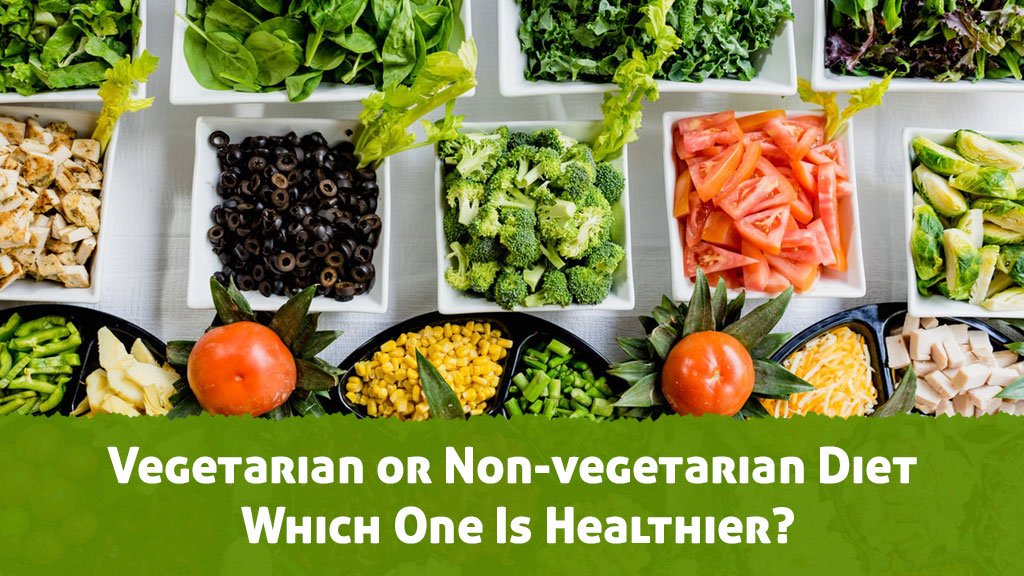Is a vegetarian diet healthier than a non-vegetarian diet? It is a question of debate that will rage a battle of words between the two factions upon the pros and cons of the two diets. The shortcomings of a vegetarian diet versus the dangerous risks of a non-vegetarian diet. Every diet can be healthy and unhealthy depending on the eating habits of both groups of people. Bewildered?
Our lifestyle depends on the manner which are taught to us by our parents. Everyone has an easy approach towards the standard of life. In the present scenario, we have become addicted to TV screens, mobile phones etc. and eat home delivered food stuff. We have no social life and physical interaction with the world has taken a back seat.
Shortage of time, is a befitting answer to blame in the above situations. Now, for such a lifestyle, “ Do you feel that any type of diet is a healthy diet??”.
In India, a vegetarian diet is linked with cultural and religious beliefs of various people. Do you think that this notion makes a vegetarian diet a healthy one and we can consume as much quantity we like and it will not harm our body. Your answer will be a big “NO”.
The diets can be classified into two major groups:-
- A Vegetarian diet: It can further be classified into three groups –
- Total vegetarian: They are also called vegans. Their diet includes only fruits, vegetables and legumes(plant food). They don’t take any by-products of animals i.e. meat and even dairy products like milk, butter and cheese etc.. They even restrain from the use of animal fur, silk as they are animal by-products.
- Lacto vegetarian: In this kind of diet people don’t eat meat but take other animal by-products like milk, cheese and butter etc. along with fruits, vegetables and legumes(plant food).
- Lacto-ovo vegetarian: Ovo here stands for “eggs”. In this diet there is addition of eggs to all the other ingredients of lacto vegetarian diet.
- A non-vegetarian diet :
This diet is a sum of lacto-ovo vegetarian diet plus by-products derived from animals like meat, poultry and fish, etc.
Advantages of a vegetarian diet
- More balanced diet
A balanced diet consists of all the necessary nutrients required by the human body. A diet having all the vegetables, fruits, grains, pulses and plant based foods is a source of all the ingredients required for a healthy balanced diet.
- Decreases heart diseases
A heart disease depends on various factors:
-
- High blood pressure
- High cholesterol
- Diabetes
- Obesity
- Atherosclerosis
A good diet for one’s health is one which has all the fibres, minerals, vitamins and is low in saturated fats. Blood pressure and cholesterol levels reported for this diet remains in the desired state which in turn, helps to reduce heart diseases.
-
Lowers BMI
BMI stands for Body Mass index.Vegetarians are more leaner and fitter than non-vegetarians. It aids in maintaining a recommended BMI levels i.e. 20-25.
Disadvantages of a vegetarian diet
- Inadequate nutrition
Vegans can’t meet the requirements of all the nutrients from their diet alone as they devoid themselves of dairy products. They have to take supplements to counter the deficiency of calcium, zinc and vitamin B12 for ideal health.
- Every vegetarian is not a healthy person
Healthy status depends on your lifestyle and not on the diet you eat. A balanced healthy diet and exercise is a precursor for a healthy life ahead. You are not eating meat but you can still have high fat cheese, junk food, ice cream, potato chips etc. Moreover a sedentary life without any physical activity will add to your woes.
Advantages of a non-vegetarian diet
- Rich in proteins, iron, calcium, vitamin B12 and fats
A non-vegetarian diet is a rich source of nutrients as well as fats. It is loaded with proteins, iron, calcium, vitamin B12 and fats. Fish is a very good source of omega 3 fatty acids.
- Strengthens our muscles and helps them grow faster
This diet helps a frail and weak figure to transform into a robust and powerful personality. It makes the muscles stronger and speeds up the transformation process.
- Enhances body stamina and hemoglobin
A stronger and healthier person is more fit physically. He/she can endure more stress of physical activity. It also increases the blood levels increasing the oxygen levels in the body.
- Boon for athletes, children and pregnant females
Non-veg is a powerhouse of energy and nutrients and can very well fulfill the needs of supplements of athletes, children and pregnant females. Athletes are part of physically demanding sports, children are in their growing stage and pregnant females have to feed another lifeform within.
Disadvantages of a vegetarian diet
- High fat content
A non-vegetarian diet consists of meat for e.g. pork, chicken, turkey, seafood etc. which has large quantity of fats. These saturated fats lead to increase in cholesterol levels and blood pressure levels.
- Trans fatty acids
When meat is deep fried in hydrogenated oil it becomes a trans fatty acid which lead to chronic diseases.
- Obesity
Large intake of non-veg increases the weight of the body. It affects the BMI at a faster rate making in roads for health issues.
- Costly
To eat a non-vegetarian diet you have to dole out extra money as it is expensive. So, it is not a piece of cake for everyone.
DO WE HAVE AN ANSWER ??
As discussed above, both the diets have its advantages and disadvantages. All the vegetarians are not healthy and same is the case with non-vegetarians. It’s your choice to select a certain diet as you wish. Both the diets are healthy with constraints.
According to me, it really depends on our eating habits and lifestyle. Excess of everything is bad. So,
- Eat a Healthy and Balanced Diet Full of All the Nutrients.
- Do Exercise to Remain Healthy and Happy in Life.
- Avoid Fried, Fast and Junk Foods.
- Avoid Processed and Packaged Foods.







